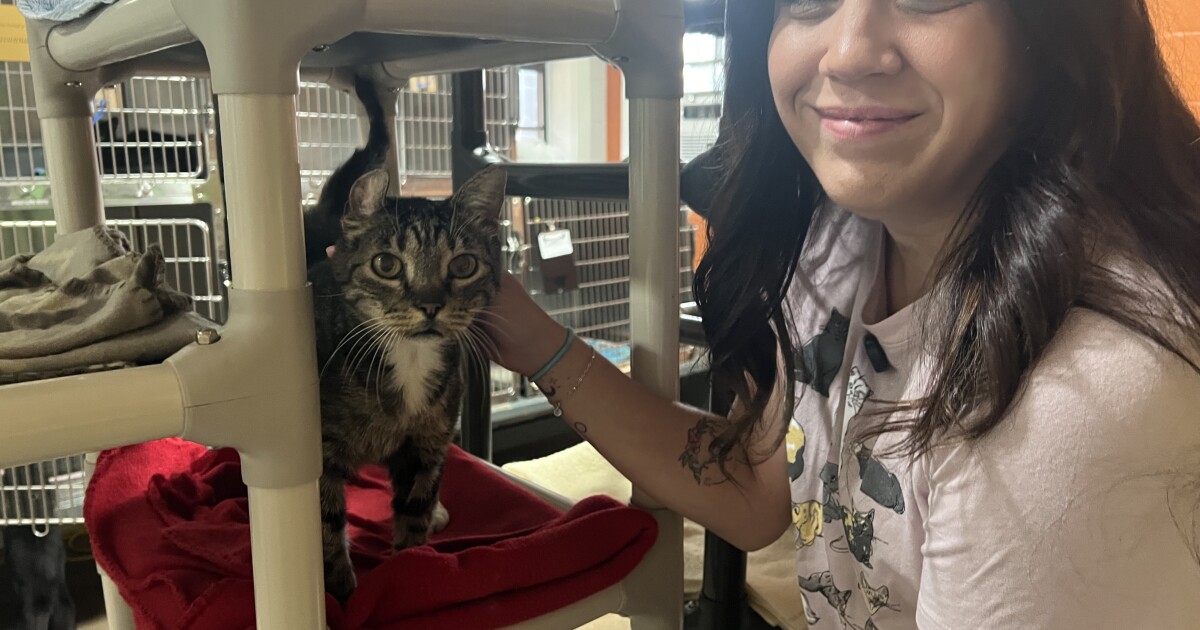A Changing Landscape for Animal Adoption: Navigating Costs and Choices
At the Escambia County Animal Shelter, the hope and excitement of potential pet adopters is palpable. Jennifer Tanner, along with her two children, visited the shelter with the intention of adopting a cat. However, as they browsed the various cats and kittens, rising veterinary costs cast a shadow over their enthusiasm.
“Everywhere I call, it’s gonna cost me $120 for the visit and rabies,” Jennifer explained, sharing her concerns while consulting her husband over the phone. Her daughter, Julia Johnston, couldn’t contain her excitement as she pointed to a nearby cage, exclaiming, “I like this one. This is an older one.”
Despite Julia’s eagerness, older pets often face significant barriers in finding homes. Recognizing this, the shelter recently made the decision to waive adoption fees for animals over the age of one year. John Robinson, the director of the Escambia County Department of Animal Welfare, elaborated on this initiative: “We try to get those animals that are a little bit harder to place into homes, just to get people to pay attention to them.”
Robinson noted that older pets might offer distinct advantages—less training required and often a calmer demeanor. This aligns with the shelter’s mission to alleviate the challenges faced by older animals in the adoption process.
The Stories Behind the Numbers
Two shelter dogs, Red and Chunks, exemplify the plight of older animals looking for loving homes. Red, who spent nearly a year in the shelter after being rescued from a hoarding situation, had serious health issues, including being heartworm-positive and suffering from a head tilt likely caused by previous trauma. Chunks, a three-year-old, was abandoned by a tenant following an eviction.
Brianna Martin, a member of the animal care staff, shared a heartwarming update: “Now they sleep cuddled up, face to face on the couch. Red’s skin was in terrible shape when he came in—itchy and red from neglect. But now, he has a great home, healthy skin, and kids who adore him.”
Such stories highlight the emotional connection that can flourish when older pets are adopted, yet they are increasingly overshadowed by harsher realities. Across the region, shelters are experiencing a surge in adult pet surrenders, primarily due to financial hardships faced by pet owners.
The Burden of Rising Veterinary Costs
Tiffany Daniel, vice president of programs at the Pensacola Humane Society, noted that many families surrender their older pets due to mounting medical expenses. “A lot of times, when people surrender their older pets, it’s because of medical problems they just can’t afford anymore,” she stated, emphasizing conditions like dental issues and allergies that contribute to increased veterinary bills.
Blake White, CEO of the Pensacola Humane Society, echoed these concerns, pointing out a troubling trend: “Vet costs are rising fast. Medications and vaccines have gone up about 15% a year recently. And there’s a national vet shortage, which drives prices even higher. It’s a real squeeze.”
This financial reality poses a critical challenge for would-be adopters, many of whom hesitate when evaluating the long-term costs associated with pet ownership. Daniel candidly remarked, “We like to say there’s no real free pet. Even if the adoption is free, there’s still food, litter, preventatives, and follow-up care.”
Yet, there are avenues for potential adopters looking for relief. “Some families can save by filling prescriptions at Walmart,” she suggested, showcasing the innovative ways people are being encouraged to maintain pet ownership during economically challenging times.
Community Support and Resource Availability
To further assist families struggling to keep their pets, the Pensacola Humane Society operates a pet pantry that distributes food and supplies twice a month. Last year alone, they provided over 10,000 pounds of kibble, aiming to ease the burdens families face during difficult times. Additionally, staff are trained to refer people to various local veterinary resources, including accessible clinics such as Tractor Supply’s PetVet.
“The goal is to relieve financial pressure so people don’t have to surrender their pets just because they’re going through a hard time,” White emphasized, highlighting the organizations’ commitment to keeping families intact.
In tandem with tackling financial barriers, the Pensacola Humane Society is also focused on matching pets with families based on their lifestyle and temperament. Daniel explained that older pets often make ideal companions for families seeking lower-energy animals, reinforcing the idea that matchmaking can significantly enhance successful adoptions.
“If someone’s looking for a couch potato, we’ll guide them toward an older dog who’s more laid back. Matchmaking makes all the difference,” she stated.
The Emotional Weight of Decision-Making
Back in the Escambia County Animal Shelter, despite the warm atmosphere and the loving gaze of eager pets, Jennifer Tanner weighed the costs and implications of her decision carefully. Ultimately, she decided to walk away, at least for the time being.
As prices climb and financial pressures loom large, both shelters and families are left reconsidering what adoption truly entails. The stories of Red, Chunks, and countless other animals serve as poignant reminders that the journey to adoption is often paved with emotional, financial, and systemic challenges that require sensitive navigation.



